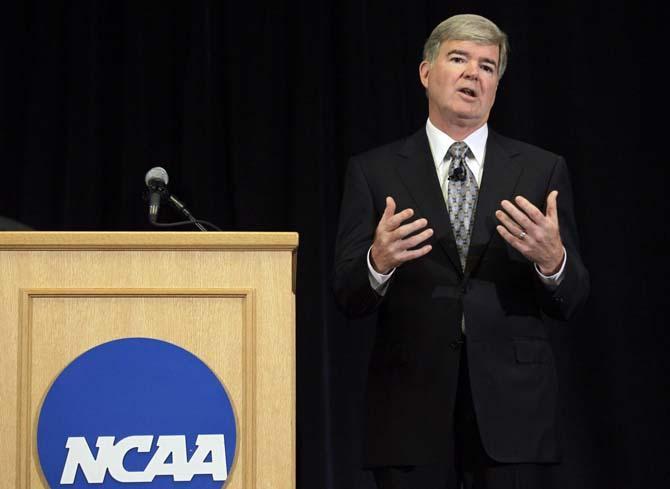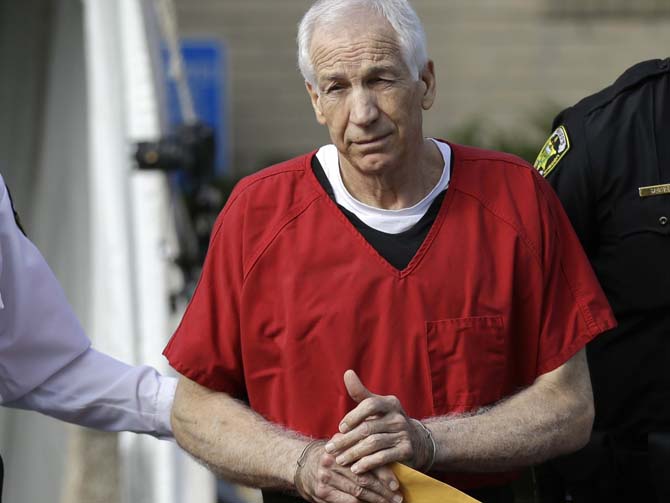The NCAA was once a strong organization with the investigative prowess to bring athletic powerhouses like Alabama football and Indiana and Kentucky basketball to its knees for rules violations.
Once the embodiment of a well-respected and feared detective with a bulldog mentality, the NCAA now more closely resembles a police force washout that’s too drunk and stubborn to get the help it needs to find the way home.
But after a three-year roller coaster of an investigation into the University of Miami, the NCAA was ready to get its swagger back when the Committee on Infractions finally announced its findings and punishments on Tuesday.
Get ready, this gets pretty heavy: The entire program will be on probation for three years and the football team’s postseason ban is over. During that time, the football team will lose nine scholarships while the basketball team will lose one per season.
Gasp. NCAA President Mark Emmert really let them have it.
Wait, what?
To call that a slap on the wrist would be like characterizing a parent sending their child to bed without supper as depraved child abuse. It’s much more like a metaphorical wagging of a finger.
It was the case that was supposed to bring credibility back to the NCAA. It was a case that began with a well-connected rat and talk of giving the death penalty to The U.
But in the end, it will be a case that goes down as yet another embarrassment for collegiate athletics’ governing body.
The NCAA is in the midst of a nightmare it can’t seem to wake up from. It hasn’t even been two months since the Johnny Manziel debacle.
After an offseason of wild partying and unprecedented attention, reports surfaced that autograph brokers had paid the Heisman
winner for his John Hancock, a severe violation of a number of NCAA regulations. The rumor mill began spinning yet again, this time about how the NCAA was going to take down Johnny Football.
But the problem, as usual, was that the knowledge involved violators share with the media doesn’t transfer into NCAA evidence.
The investigators can ask them to come forward, but without the ability to subpoena or punish them, they are basically cops asking criminals to roll on their buddies without any threat of repercussions or enticement of a reward.
The end result of the investigation was a joint statement from Texas A&M and the NCAA that even though no evidence of payment was uncovered, Manziel would be suspended for the first half of the season opener.
It was a case that began with rumors of college football’s most famous player losing his amateur eligibility. But instead it was a case that ended with 30 minutes of missed football against Rice and an endless feed of Twitter jokes about how much partying Johnny Football could fit into his newfound time off.
In fact, the NCAA hasn’t brought the hammer down since Penn State. On July 23, 2012, Emmert announced the football program would receive a four-year postseason ban, vacate 112 victories, pay a $60 million fine and have its scholarship total reduced among other penalties.
Now that is how you take down a program. Only problem is the NCAA didn’t follow any of its own investigative procedures, instead just going off the findings of the Freeh Report, and it didn’t have any real grounds to dole out punishment in the case.
Don’t get me wrong. What Jerry Sandusky did to his victims was monstrous and he should rot in a jail cell for the rest of his life, along with anyone who helped cover it up.
But actual investigators, also known as the criminal justice system, had already dealt with those responsible, and all the NCAA did was dog pile on top of the remnants of the program and people who played no role in what they were being punished for.
Only a year later, the NCAA appears to be flip-flopping on its ruling. Last month it was announced that Penn State would gradually be restored to its full amount of scholarship.
That makes three gaffes in less than two years. I’m not one to call for someone’s livelihood, but if the NCAA wants to restore its previous credibility, Emmert and company need to seriously re-evaluate how they do things or get out of the way and let some real investigators come in and fix the problems.
Opinion: Miami football case disastrous for NCAA’s reputation
By James Moran
October 23, 2013
NCAA President Mark Emmert






